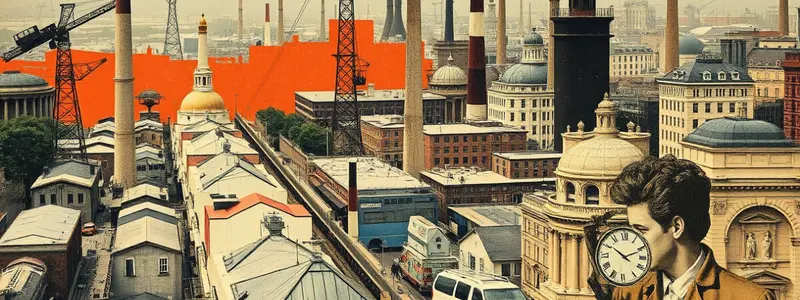Podcast
Questions and Answers
The Industrial Revolution changed how people ________ and _________.
The Industrial Revolution changed how people ________ and _________.
The Industrial Revolution changed how people ________ and ________.
The Industrial Revolution changed how people ________ and ________.
lived and worked
How did the Industrial Revolution change the cities?
How did the Industrial Revolution change the cities?
Caused the cities to grow bigger
What is urbanization?
What is urbanization?
Why did people move from the countryside to the city?
Why did people move from the countryside to the city?
Why did the working class in the cities grow?
Why did the working class in the cities grow?
How were the working conditions in the factories?
How were the working conditions in the factories?
Did adults and children sometimes die from working in the factories?
Did adults and children sometimes die from working in the factories?
Besides injuries due to poor working conditions, what were the two biggest problems for people working in the factories?
Besides injuries due to poor working conditions, what were the two biggest problems for people working in the factories?
Even though conditions, pay and hours were terrible, was living in the city and working in the factory better or worse than living in the countryside? Why?
Even though conditions, pay and hours were terrible, was living in the city and working in the factory better or worse than living in the countryside? Why?
Over time, what happened that increased pay, made factories safer, and reduced pollution?
Over time, what happened that increased pay, made factories safer, and reduced pollution?
As conditions improved because of new laws, why were more people able to move from the working class to the middle class?
As conditions improved because of new laws, why were more people able to move from the working class to the middle class?
The Industrial Revolution changed women's lives forever.
The Industrial Revolution changed women's lives forever.
Why did family size drop during the Industrial Revolution?
Why did family size drop during the Industrial Revolution?
Where were women able to find work?
Where were women able to find work?
What is suffrage?
What is suffrage?
When did women gain the right to vote?
When did women gain the right to vote?
What allowed women to vote?
What allowed women to vote?
What is liberalism?
What is liberalism?
What were the ideas of Liberalism? (6)
What were the ideas of Liberalism? (6)
What does the French word 'Laissez-faire' mean?
What does the French word 'Laissez-faire' mean?
What was the Laissez-faire idea?
What was the Laissez-faire idea?
Who put forth the Laissez-faire idea?
Who put forth the Laissez-faire idea?
Who was Adam Smith?
Who was Adam Smith?
What was the purpose of Laissez-faire?
What was the purpose of Laissez-faire?
What is utilitarianism?
What is utilitarianism?
What are three examples of utilitarianism?
What are three examples of utilitarianism?
What was Marxism?
What was Marxism?
Who was the founder of Marxism?
Who was the founder of Marxism?
When was Marxism founded?
When was Marxism founded?
What were some of Karl Marx's beliefs that led to the development of Marxism?
What were some of Karl Marx's beliefs that led to the development of Marxism?
What is another word for 'working class'?
What is another word for 'working class'?
What are 3 countries whose socialist parties based their ideas on Marxism?
What are 3 countries whose socialist parties based their ideas on Marxism?
What is a present-day manifestation of socialism?
What is a present-day manifestation of socialism?
What are labor unions?
What are labor unions?
Flashcards are hidden until you start studying
Study Notes
Industrial Revolution Overview
- Transformed living and working conditions for people, promoting urbanization.
- Urbanization: Rapid city growth as people migrated from rural areas due to industrial jobs.
Migration to Cities
- Movement from countryside to cities driven by decreased agricultural labor needs and increased factory job opportunities.
- Factory jobs led to significant growth in the working class as industries flourished.
Working Conditions
- Factory conditions described as terrible, often leading to injuries and fatalities among workers of all ages.
- Major issues included long hours and low pay despite the chance to earn money, making urban living more appealing than rural life.
Legislative Changes
- Introduction of new laws gradually improved factory conditions, increased wages, and reduced pollution.
- As conditions improved, many working-class individuals transitioned to the middle class, enhancing their social standing.
Women's Roles and Suffrage
- The Industrial Revolution significantly impacted women's lives, offering new job opportunities in industry, government, and education.
- Decline in family size as fewer children were necessary for agricultural labor.
- Women's suffrage gained momentum, culminating in the right to vote in 1920 through the 19th Amendment.
Liberalism and Economic Theories
- Liberalism emphasized basic rights, equality, limited government power, and elected assemblies for law-making.
- Key concepts included freedom of speech and press; however, not all believed in universal voting rights.
- Laissez-faire: Economic doctrine advocating minimal government interference, promoted by economist Adam Smith, for a prosperous society.
Utilitarianism
- Philosophy aimed at maximizing happiness for the majority, advocating for women's rights, better education, and improved health services.
Marxism
- Founded by Karl Marx in the 1800s, Marxism proposed that society should collectively own the means of production.
- Key beliefs included the harmful impact of class competition and the eventual rise of the working class (proletariat) to establish a communist society.
Socialism and Labor Unions
- Several European countries, including Britain, Germany, and Scandinavia, based their socialist parties on Marxist principles.
- Present-day socialism is exemplified by labor unions, which advocate for better wages and working conditions for their members.
Studying That Suits You
Use AI to generate personalized quizzes and flashcards to suit your learning preferences.




